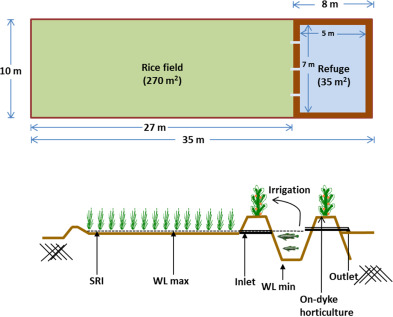System of Rice Intensification
The System of Rice Intensification (SRI) is an agroecological methodology for increasing the productivity of irrigated rice by changing the management of plants, soil, water, and nutrients. SRI aims to improve yields while reducing water use and environmental impact.

Lay-out design of Integrated System of Rice Intensification (ScienceDirect)
View open jobs in this Solution
Example Organizations
- SRI International Network and Resources Center (SRI-Rice) - Promotes research and adoption of SRI practices globally.
- International Rice Research Institute (IRRI) - Develops rice varieties and sustainable farming practices.
- CGIAR Research Program on Climate Change, Agriculture and Food Security (CCAFS) - Addresses the challenges of global warming and food security.
Overview
The System of Rice Intensification (SRI) was developed in the 1980s by Henri de Laulanié in Madagascar. SRI principles include:
- Transplanting young seedlings
- Spacing plants widely
- Using organic inputs
- Judicious water application
- Mechanical weed control
Benefits of SRI include increased yields (up to 50% or more), reduced water use (20-40%), and lower fertilizer and pesticide requirements. SRI also has the potential to decrease methane emissions from rice paddies.
Progress Made
Significant advancements have been made in SRI practices:
- Enhanced Irrigation Systems: More efficient water management techniques.
- Improved Seeds: Development of rice varieties suited for SRI practices.
- Efficient Fertilizer Application: Optimized use of organic and inorganic fertilizers.
- Crop Management: Better techniques for planting, weeding, and harvesting.
Solutions by Sector
Water Management
- Alternate Wetting and Drying (AWD): Technique to reduce water use while maintaining yields.
- Raised Bed Systems: Improved drainage and water control in rice fields.
- Laser Land Leveling: Precise field leveling for efficient water distribution.
Case Studies:
- AWD in Vietnam: Reduced water use by 30% while maintaining yields (IRRI).
- SRI in Madagascar: Increased yields by 84% while reducing water use (Cornell University).
- SRI in India: Tamil Nadu Agricultural University reported yield increases of 20-40% with 50% less water (TNAU).
Soil Health
- Organic Matter Management: Incorporating crop residues and green manures.
- Reduced Tillage: Minimizing soil disturbance to improve soil structure.
- Biochar Application: Using biochar to enhance soil fertility and carbon sequestration.
Case Studies:
- SRI in Indonesia: Increased soil organic matter by 25% over three years (SRI-Rice).
- Conservation Agriculture in China: Reduced tillage increased soil organic carbon by 12% (FAO).
- Biochar in Japan: Increased rice yields by 15% while sequestering carbon (MAFF Japan).
Pest Management
- Integrated Pest Management (IPM): Combining biological, cultural, and chemical controls.
- Push-Pull Technology: Using companion plants to repel pests and attract natural enemies.
- Resistant Varieties: Developing rice varieties with enhanced pest resistance.
Case Studies:
- IPM in Bangladesh: Reduced pesticide use by 80% while maintaining yields (FAO).
- Push-Pull in East Africa: Reduced stem borer infestation by 80% (ICIPE).
- Resistant Varieties in Philippines: IRRI-developed varieties reduced pesticide use by 50% (IRRI).
Lessons Learned
- R&D is Crucial: Continuous research and development is vital to enhance productivity and efficiency.
- Stakeholder Engagement: Involving farmers, researchers, and policymakers is essential for effective implementation.
- Policy Framework: Clear policies are needed to guide technology adoption and support farmers.
- Accessibility: Ensure SRI practices are available and affordable for small-scale farmers.
- Adaptability: SRI principles need to be adapted to local conditions and farmer needs.
Challenges Ahead
- Awareness: Many stakeholders remain unaware of SRI and its potential in combating climate change.
- Technical Knowledge: Farmers and workers need better training on SRI techniques.
- Financial Constraints: Farmers need monetary support to adopt SRI, especially in the transition period.
- Infrastructure: Better irrigation, storage, and processing facilities are required.
- Socio-cultural Barriers: Existing beliefs and customs may deter farmers from adopting SRI.
Best Path Forward
- Raise Awareness: Promote SRI benefits to a wider audience through demonstration farms and farmer-to-farmer learning.
- Encourage Research: Invest in further R&D to enhance SRI practices and adapt them to different agroecological zones.
- Support & Promote: Offer training, resources, and incentives to encourage SRI adoption.
- Policy Support: Implement policies that incentivize SRI adoption and support farmers during the transition period.
- Integrate with Climate Policy: Incorporate SRI into national and international climate change mitigation strategies.
Key organizations like the International Rice Research Institute (IRRI), System of Rice Intensification Network (SRI-Rice), and CGIAR Research Program on Climate Change, Agriculture and Food Security (CCAFS) should continue their advocacy and support for SRI adoption and improvement.
Image credit: ScienceDirect